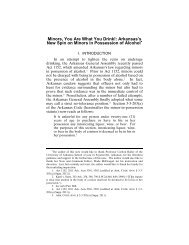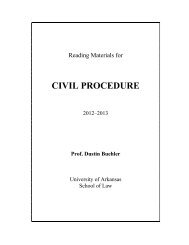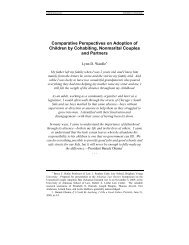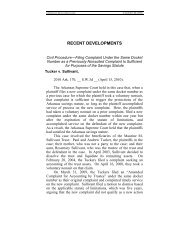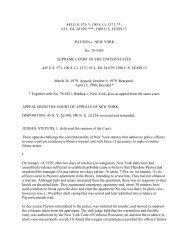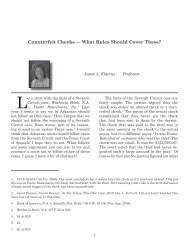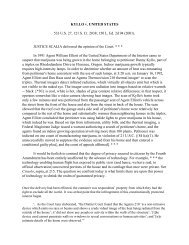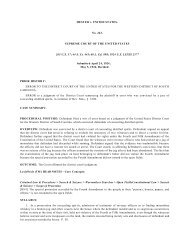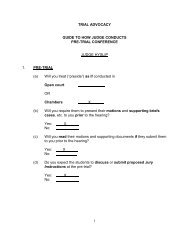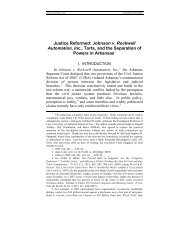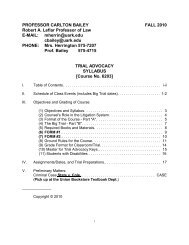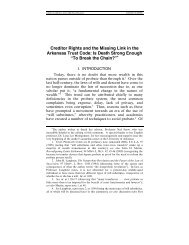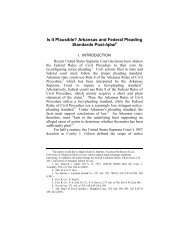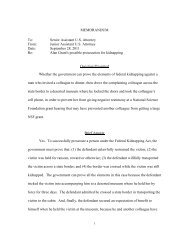Facebook Discovery and the Unbearable Sameness of Internet Law
Facebook Discovery and the Unbearable Sameness of Internet Law
Facebook Discovery and the Unbearable Sameness of Internet Law
You also want an ePaper? Increase the reach of your titles
YUMPU automatically turns print PDFs into web optimized ePapers that Google loves.
48 ARKANSAS LAW REVIEW [Vol. 65:39<br />
communications, although sensitive, are not more likely to be<br />
sensitive than financial records, or private papers held in<br />
storage, or mail held in a private mailbox.<br />
In at least this respect, <strong>the</strong> ECPA is <strong>the</strong>refore an example <strong>of</strong><br />
a precipitous reaction by <strong>the</strong> legislature to changed technology,<br />
even when <strong>the</strong>re was no real need to change <strong>the</strong> law at all. 31<br />
<strong>Law</strong>yers unfamiliar with <strong>the</strong> ECPA might be forgiven for not<br />
anticipating that <strong>the</strong> law would change in this way. In any<br />
event, <strong>the</strong> practical effect <strong>of</strong> <strong>the</strong> change in most cases will be<br />
muted. Even if a nonparty ISP cannot be subpoenaed directly to<br />
produce a person’s communications relevant to <strong>the</strong> dispute, <strong>the</strong><br />
person him- or herself can. That is, a party to a civil lawsuit can<br />
simply propound a Rule 34 document request on his or her<br />
opposing party to produce relevant electronic communications<br />
from <strong>the</strong> opposing party’s ISP, or subpoena a nonparty to do so.<br />
As long as opposing parties still have access to <strong>the</strong>ir accounts,<br />
<strong>the</strong> documents are likely to be held within <strong>the</strong>ir “possession,<br />
custody, or control.” Indeed, several courts have ordered parties<br />
to produce <strong>the</strong>ir social-networking communications or o<strong>the</strong>r<br />
messages, or at least consent to <strong>the</strong>ir production by <strong>the</strong> relevant<br />
ISP. 32 Such an order does not fall afoul <strong>of</strong> <strong>the</strong> ECPA, because<br />
as one court noted, an ordinary individual is not an ISP, <strong>and</strong> thus<br />
is not subject to any <strong>of</strong> <strong>the</strong> disclosure prohibitions in section<br />
2702. 33<br />
III. FALSE POSITIVES: DISCOVERY OF SOCIAL<br />
NETWORK POSTS<br />
The unavailability <strong>of</strong> subpoenas for nonparty ISPs under<br />
<strong>the</strong> ECPA is not a serious impediment to discovery, as discovery<br />
may be had directly from <strong>the</strong> party itself. Under Rule 34 <strong>of</strong> <strong>the</strong><br />
Federal Rules <strong>of</strong> Civil Procedure <strong>and</strong> equivalent state rules, a<br />
party can request ano<strong>the</strong>r person or party “to produce <strong>and</strong> permit<br />
31. Protecting <strong>the</strong> privacy <strong>of</strong> electronic <strong>and</strong> telephonic communications has been a<br />
vexing problem for Congress <strong>and</strong> for courts since <strong>the</strong> early days <strong>of</strong> <strong>the</strong> twentieth century.<br />
See generally Boyden, supra note 23, at 6-1 to 6-10.<br />
32. See, e.g., Flagg v. City <strong>of</strong> Detroit, 252 F.R.D. 346, 359 (E.D. Mich. 2008)<br />
(ordering production <strong>of</strong> text messages); People v. Christian, No. 08F09791 (Cal. Super. Ct.<br />
Feb. 4, 2011) (ordering juror to consent to production <strong>of</strong> <strong>Facebook</strong> posts made during trial<br />
to <strong>the</strong> court).<br />
33. Largent v. Reed, No. 2009-1823, 2011 WL 5632688, at *6-7 (Pa. Ct. C.P. Nov.<br />
8, 2011).



